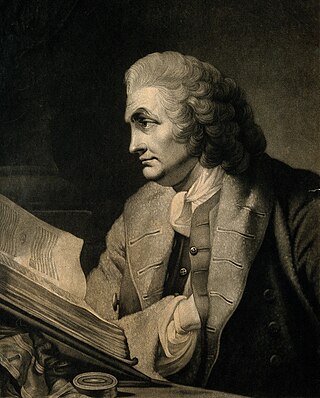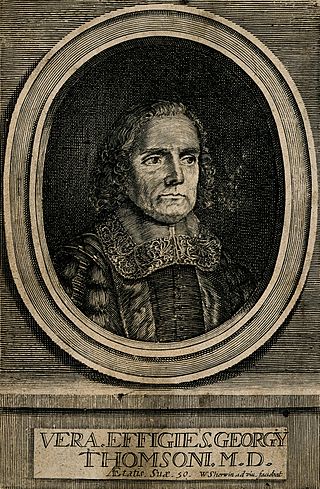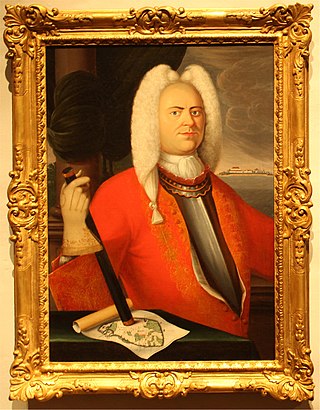Related Research Articles

Sir Hans Sloane, 1st Baronet, was an Anglo-Irish physician, naturalist, and collector, with a collection of 71,000 items which he bequeathed to the British nation, thus providing the foundation of the British Museum, the British Library, and the Natural History Museum, London. He was elected to the Royal Society at the age of 24. Sloane travelled to the Caribbean in 1687 and documented his travels and findings with extensive publications years later. Sloane was a renowned medical doctor among the aristocracy, and was elected to the Royal College of Physicians at age 27. Though he is credited with the invention of chocolate milk, it is more likely that he learned the practice of adding milk to drinking chocolate while living and working in Jamaica. Streets and places were later named after him, including Hans Place, Hans Crescent, and Sloane Square in and around Chelsea, London – the area of his final residence – and also Sir Hans Sloane Square in Killyleagh, his birthplace in Ulster.

Theophilus Cibber was an English actor, playwright, author, and son of the actor-manager Colley Cibber.
William Houstoun (1695?–1733) was a Scottish surgeon and botanist who collected plants in the West Indies, Mexico and South America.

William Cadogan was an 18th-century British physician and writer on child care and nursing.

Roger Morris was an English architect whose connection with Colen Campbell brought him to the attention of Henry Herbert, 9th Earl of Pembroke, with whom Morris collaborated on a long series of projects.
Joseph Micklethwaite, 1st Viscount Micklethwaite was an English politician, peer and diplomat.

Geminiano Giacomelli was an Italian composer.
Peter Shaw (1694–1763) was an English physician and medical author.

George Thomson was an English physician, medical writer and pamphleteer. He was a leading figure in an attempt to create a "College of Chemical Physicians", a rival to the established Royal College of Physicians. He rejected the traditional Galenic approach to medicine and argued against medical bloodletting, purging and the doctrine of curing by "contraries". He performed a splenectomy on a dog which stimulated debate in scientific and medical circles, and challenged prevailing medical theories about the body.
Henry Barham F.R.S. (1670?–1726) was an English writer on natural history.
George Heathcote was an English merchant and philanthropist and Tory politician who sat in the House of Commons from 1727 to 1747. He was Lord Mayor of London in 1742.
Cromwell Mortimer FRS was a British physician, antiquary and second secretary of the Royal Society from 1730 to 1752.
Thomas Sclater, later Thomas Bacon, was an English lawyer and Tory politician who sat in the House of Commons at various times between 1713 and 1736.
Edward Milward (1712?–1757) was an English physician and historian of medicine.

Stephanus Versluijs or Versluys was the 21st Governor of Dutch Ceylon.
William Rutty M.D. (1687–1730) was an English physician.
William Bowles, of Burford, Worcestershire, was an English glass manufacturer and Whig politician who sat in the House of Commons for more than 20 years from 1727 to 1748.
Sir Richard Hopkins of St. Botolph's, Bishopsgate, London was a British merchant and politician who sat in the House of Commons from 1724 to 1727.
John Goddard was a British Whig politician who sat in the House of Commons from 1727 to 1736.
Francis Rose was a plantation owner in Jamaica. He was active in the politics of the island and was elected to serve in the House of Assembly of Jamaica multiple times, becoming speaker in 1702, and later president of the Council of Jamaica.
References
- 1 2
 One or more of the preceding sentences incorporates text from a publication now in the public domain : "Clifton, Francis". Dictionary of National Biography . London: Smith, Elder & Co. 1885–1900.
One or more of the preceding sentences incorporates text from a publication now in the public domain : "Clifton, Francis". Dictionary of National Biography . London: Smith, Elder & Co. 1885–1900. - ↑ Ulrich Tröhler. "The introduction of numerical methods to assess the effects of medical interventions during the 18th century: a brief history". James Lind Library. Retrieved 8 December 2011.